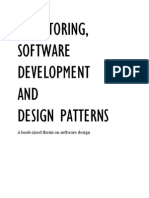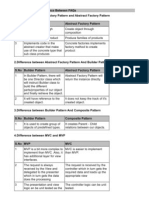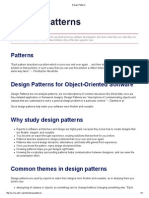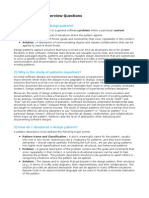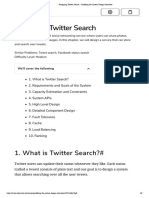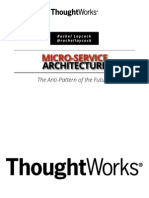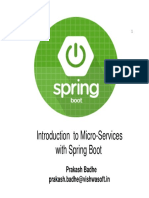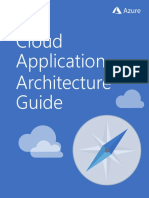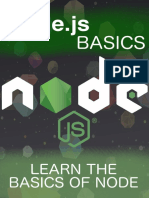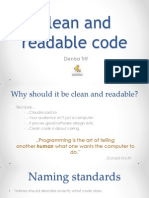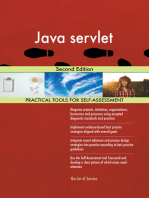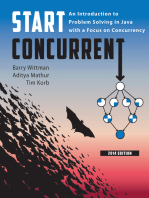REST Cheatsheet
REST Cheatsheet
Uploaded by
hoanCopyright:
Available Formats
REST Cheatsheet
REST Cheatsheet
Uploaded by
hoanCopyright
Available Formats
Share this document
Did you find this document useful?
Is this content inappropriate?
Copyright:
Available Formats
REST Cheatsheet
REST Cheatsheet
Uploaded by
hoanCopyright:
Available Formats
Resource Routes (in config/routes.
rb)
Simple
map.resources :users, :sessions
de
Nested
map.resources :teams do |teams|
p C o
Pee
teams.resources :players
end
Customized
map.resources :articles,
:collection => {:sort => :put},
:member => {:deactivate => :delete},
:new => {:preview => :post}, REST Screencast $9 at http://peepcode.com
:controller => 'articles',
:singular => 'article', 85 minutes of RESTful goodness
:path_prefix => '/book/:book_id',
:name_prefix => 'book_'
Including the default route (/:controller/:action/:id) will allow any verb to access any action. This is usually
not what you want, so you should probably delete it from routes.rb
Standard Methods Verb Path Action Formats in the URL Path
plural_path GET /teams index formatted_plural_path(:xml) /teams.xml
singular_path(id) GET /teams/1 show formatted_singular_path(id, :rss) /teams/1.rss
new_singular_path GET /teams/new new formatted_players_path(@team, :atom) /teams/1/players.atom
plural_path POST /teams create formatted_player_path(@team, @player, :js) /teams/1/players/5.js
edit_singular_path(id) GET /teams/1;edit edit formatted_player_path(:team_id => 1, /teams/1/players/5.js
:id => 5,
singular_path(id) PUT /teams/1 update :format => :js)
Any URL-generating method can take a hash of options instead of bare arguments. This is the only way to
singular_path(id) DELETE /teams/1 destroy
generate a URL with extra querystring params.
Each method also has a counterpart ending in _url that includes the protocol, domain, and port.
There is also a hash_for_ version of each method that returns a hash instead of a string.
button_to "Destroy", team_path(@team), :confirm => "Are you sure?", :method => :delete
link_to "Destroy", team_path(@team), :confirm => "Are you sure?", :method => :delete
link_to_remote "Destroy", :url => team_path(@team), :confirm => "Are you sure?", :method => :delete
form_for :team, @team, :url => team_path(@team), :html => { :method => :put } do |f| ...
Nested Resources Path Useful Plugins
players_path(@team) /teams/:team_id/players
/teams/1/players ➥ Beast Forum (an app built with RESTful design)
player_path(@team, @player) /teams/:team_id/players/:id ➥ RESTful Authentication Plugin
/teams/1/players/5 ➥ Simply Helpful Plugin
Nested resources must be defined in routes.rb. See above for an example.
Custom Methods Path Action Map Options
sort_tags_path /tags;sort sort :collection => {:sort => :put}
deactivate_tag_path(id) /tag/1;deactivate deactivate :member => {:deactivate => :delete}
preview_new_tag_path /tags/new;preview preview :new => {:preview => :post}
tags_path(book_id) /book/:book_id/tags – :path_prefix => "/book/:book_id"
tag_path(book_id, id) /book/:book_id/tags/:id (You get this for free with nested resources)
book_tags_path(book_id) Usually used in a nested block or with – :name_prefix => "book_"
book_tag_path(book_id, id) a path_prefix (Should be used with a :path_prefix or in a nested resource
book_new_tag_path(book_id) declaration)
book_deactivate_tag_path(book_id, id)
Repeated resource names in routes.rb will overwrite previous declarations. Use :name_prefix to preserve dynamic method names for multiple declarations of the same resource.
respond_to { |wants| wants.all | .text | .html | .js | .ics | .xml | .rss | .atom | .yaml }
Add New MIME types (in config/environment.rb) Scaffold Resource Generator
Mime::Type.register "image/jpg", :jpg ./script/generate scaffold_resource
Mime::Type.register "application/vnd.visa+xml", :visa Episode
title:string
Types listed here can be used in a respond_to block and as a forced format extension description:text
at the end of urls. program_id:integer
Use a singular word for the model/resource name. The other arguments will be used to pre-populate the
database migration and fields in view templates.
You might also like
- Real-World Next.js: Build scalable, high-performance, and modern web applications using Next.js, the React framework for productionFrom EverandReal-World Next.js: Build scalable, high-performance, and modern web applications using Next.js, the React framework for productionNo ratings yet
- Re Factoring and Design PatternsDocument783 pagesRe Factoring and Design PatternsEvans Krypton Sowah100% (6)
- Data Intensive Computing Architectures Algorithms and ApplicationsDocument300 pagesData Intensive Computing Architectures Algorithms and ApplicationsMarius Cristian CapatinaNo ratings yet
- Design Patterns HandbookDocument167 pagesDesign Patterns HandbookThiago MonteiroNo ratings yet
- Design Pattern Interview Questions in .NET DotnetuncleDocument4 pagesDesign Pattern Interview Questions in .NET DotnetuncleSrinivasan CNo ratings yet
- Designing Data Intensive Applications: Part 1: Storage and RetrievalDocument85 pagesDesigning Data Intensive Applications: Part 1: Storage and RetrievalRavi LochanNo ratings yet
- UML Quick Reference CardDocument1 pageUML Quick Reference Cardallen.bang100% (6)
- How To Pass A Silicon Valley Software InterviewDocument95 pagesHow To Pass A Silicon Valley Software Interviewphulam146No ratings yet
- Design Patterns Difference FAQS Compiled-1Document8 pagesDesign Patterns Difference FAQS Compiled-1Umar Ali100% (1)
- Design PatternsDocument4 pagesDesign PatternsNakan PhungNo ratings yet
- Design Pattern Interview Questions Part 1Document15 pagesDesign Pattern Interview Questions Part 1Biru C. SainjuNo ratings yet
- Design An ATMDocument12 pagesDesign An ATMabhiraj77No ratings yet
- Building Microservice Architectures (Neal Ford)Document80 pagesBuilding Microservice Architectures (Neal Ford)sefdeni100% (8)
- Scalable System DesignDocument22 pagesScalable System DesignMd Hasan AnsariNo ratings yet
- WinSock Programming FundamentalDocument81 pagesWinSock Programming FundamentalKapil Nagwanshi100% (2)
- Software Design GuideDocument9 pagesSoftware Design GuidePrasanna ParinagantiNo ratings yet
- Understanding Oauth 2Document14 pagesUnderstanding Oauth 2jimi45No ratings yet
- Design Patterns Interview QuestionsDocument13 pagesDesign Patterns Interview QuestionsGopinath100% (2)
- JDBC Interview QuestionsDocument9 pagesJDBC Interview QuestionsPavanKumarNo ratings yet
- Designing Twitter Search - Grokking The System Design InterviewDocument9 pagesDesigning Twitter Search - Grokking The System Design Interviewhimanshu bansalNo ratings yet
- Micro ServicesDocument2 pagesMicro ServicesNitesh KumarNo ratings yet
- Core Java Interview QuestionsDocument15 pagesCore Java Interview QuestionsRanga Rao KaranamNo ratings yet
- AngularJS Dev GuideDocument123 pagesAngularJS Dev GuideKat Hawthorne100% (1)
- C# Coding Standards and Best Programming PracticesDocument58 pagesC# Coding Standards and Best Programming PracticesKiran PatilNo ratings yet
- Micro Service ArchitectureDocument58 pagesMicro Service Architectureprathip100% (1)
- Design PatternsDocument71 pagesDesign PatternsJasintha Dasanayaka100% (2)
- DS NotesDocument170 pagesDS NotesJune MohanNo ratings yet
- Why System DesignDocument229 pagesWhy System DesignApoorv Agarwal0% (1)
- Design Pattern TutorialDocument169 pagesDesign Pattern TutorialTrung NgoNo ratings yet
- Low Level DesignDocument12 pagesLow Level Designhedimit846No ratings yet
- Free NodeJS Interview Questions & Answers - by Shailendra ChauhanDocument14 pagesFree NodeJS Interview Questions & Answers - by Shailendra ChauhanDotNetTricksNo ratings yet
- Design Phase in OOADDocument28 pagesDesign Phase in OOADAnkit KhandelwalNo ratings yet
- Blind 75 LeetCode QuestionsDocument46 pagesBlind 75 LeetCode QuestionsshivamvaishampayanNo ratings yet
- 16 System Design Concepts I Wish I Knew Before The InterviewDocument18 pages16 System Design Concepts I Wish I Knew Before The InterviewZrako PrcNo ratings yet
- Spring Boot ReferenceDocument349 pagesSpring Boot Referencefadilah aliNo ratings yet
- 543 Net Architecture Interview Questions Answers GuideDocument7 pages543 Net Architecture Interview Questions Answers GuideShashwat ShuklaNo ratings yet
- System Design Concepts To ReviseDocument12 pagesSystem Design Concepts To ReviseAliNo ratings yet
- Angular 7 For BeginnersDocument65 pagesAngular 7 For BeginnersDivyaKiranmayeeNo ratings yet
- Hibernate NotesDocument4 pagesHibernate NotessasirekhaNo ratings yet
- Design PatternsDocument69 pagesDesign PatternsryanNo ratings yet
- Introduction To Micro-ServicesDocument46 pagesIntroduction To Micro-Servicesroshni2012No ratings yet
- CleanCodeHandbook v1.0.3Document100 pagesCleanCodeHandbook v1.0.3Zaim MusaNo ratings yet
- Cloud Application Architecture Guide EN GB PDFDocument329 pagesCloud Application Architecture Guide EN GB PDFkiran100% (1)
- Grokking Java Interview SampleDocument21 pagesGrokking Java Interview SampleGaurav SuryavanshiNo ratings yet
- Nodejsbasics PDFDocument25 pagesNodejsbasics PDFArkar Min MyatNo ratings yet
- Clean and Readable CodeDocument11 pagesClean and Readable CodeTrif Denisa100% (1)
- React JS QuestionsDocument13 pagesReact JS QuestionsMuthkkumar sivanandanNo ratings yet
- The Ultimate iOS Interview Playbook: Conquer Swift, frameworks, design patterns, and app architecture for your dream jobFrom EverandThe Ultimate iOS Interview Playbook: Conquer Swift, frameworks, design patterns, and app architecture for your dream jobNo ratings yet
- Hands-On RESTful Web Services with Go: Develop elegant RESTful APIs with Golang for microservices and the cloud, 2nd EditionFrom EverandHands-On RESTful Web Services with Go: Develop elegant RESTful APIs with Golang for microservices and the cloud, 2nd EditionRating: 2.5 out of 5 stars2.5/5 (1)
- Start Concurrent: An Introduction to Problem Solving in Java with a Focus on Concurrency, 2014From EverandStart Concurrent: An Introduction to Problem Solving in Java with a Focus on Concurrency, 2014No ratings yet

